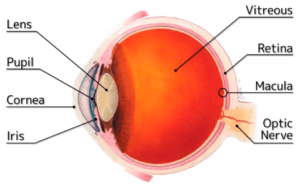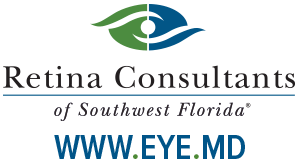Retinal Vein Occlusion
Diseases of the Retina / Vitreous: Retinal Vein Occlusions
What are Retinal Vein Occlusions?
 A Retinal Vein Occlusion is a blockage or obstruction of the veins in the retina. The retina is the light-sensitive layer of tissue that lines the back wall of the eye and is responsible for vision.
A Retinal Vein Occlusion is a blockage or obstruction of the veins in the retina. The retina is the light-sensitive layer of tissue that lines the back wall of the eye and is responsible for vision.
There are two forms of Retinal Vein Occlusions:
- Central Retinal Vein Occlusions (CRVO) – occur when the main retinal vein is blocked, causing the blood flow to be reduced to the entire retina. This can cause a marked decrease in vision, as well as pain with an increase in eye pressure.
- Branch Retinal Vein Occlusions (BRVO) – occur when a branch of the main retinal vein becomes obstructed. Blood flow is reduced in a portion of the retina. The amount of vision loss is usually not as severe as in CRVO.
What Causes Retinal Vein Occlusions?
What Causes Retinal Vein Occlusions?
The cause of a Retinal Vein Occlusion may be discovered through an evaluation of the retina or a general medical evaluation. Sometimes, the source of a Retinal Vein Occlusion cannot be identified, despite testing. The most common risk factors that may contribute to Retinal Vein Occlusion include high blood pressure, diabetes, atherosclerosis, blood disorders, and glaucoma.
What are the Symptoms of Retinal Vein Occlusions?
What are the Symptoms of Retinal Vein Occlusions?
 Decreased vision is the most common symptom. Other symptoms include floaters or spots in the vision. In severe cases, eye pain can occur as a result of increased eye pressure. Severe cases also can result in vision loss, permanent damage to the eye, and even loss of the eye.
Decreased vision is the most common symptom. Other symptoms include floaters or spots in the vision. In severe cases, eye pain can occur as a result of increased eye pressure. Severe cases also can result in vision loss, permanent damage to the eye, and even loss of the eye.
How is a Retinal Vein Occlusion Detected?
How is a Retinal Vein Occlusion Detected?
Your eye doctor will use eye drops to dilate or enlarge your pupils. Dilating the pupils allows your eye doctor to view the back of the eye better. You may need testing, including a fluorescein angiography. Fluorescein angiography is a test that uses a diagnostic agent called fluorescein that is injected into a vein in your arm. It is used to enhance the specialized photograph that is taken to evaluate the retina.
What are the Treatment Options?
What are the Treatment Options?
There is no known cure for retinal vein occlusion. However, there are several treatments for the condition.
- Intravitreal injections of protein inhibiting drugs, called Anti-VEGF’s, are also administered by the physician directly into the eye during an office visit. These drugs work to decrease the macular edema (macular swelling) associated with the blockage of blood flow into the retina.
- Ozurdex, recently approved by the FDA, is administered into the eye via injection by the physician. The implant delivers an extended dose of a steroid to the retina. In clinical studies, patients achieved an average of a three-line improvement in their vision when reading from an eye chart compared to those patients who received a placebo.
- Laser Treatment may help improve sight in some patients but success is limited. Laser treatment is a high energy beam of light used to seal leaking blood vessels in the hope of reducing swelling in the macula. Laser treatment is performed on an outpatient basis in Retina Consultants’ offices.
What You Can Do to Protect Your Vision
What You Can Do to Protect Your Vision
Early detection and treatment, is the best way to prevent vision loss. Regular yearly examinations by your eye doctor are extremely important because eye problems can develop at any age. Urgent evaluation is warranted if you have a loss of vision or pain.
Making the Most of Your Remaining Vision
Making the Most of Your Remaining Vision
 Early detection and treatment may reduce the loss of vision from Diabetic Retinopathy. However, if some loss of vision should occur, it doesn’t have to rob you of life’s simplest pleasures if you learn how to use your remaining eyesight to see your best. Low vision aids, special lenses, or electronic systems and training can maximize your ability to read and perform other activities.
Early detection and treatment may reduce the loss of vision from Diabetic Retinopathy. However, if some loss of vision should occur, it doesn’t have to rob you of life’s simplest pleasures if you learn how to use your remaining eyesight to see your best. Low vision aids, special lenses, or electronic systems and training can maximize your ability to read and perform other activities.
The Low Vision Rehabilitation Center of Retina Consultants of Southwest Florida can give you more information about the training and devices available.
More Scientific Reading
More Scientific Reading
Please use the links below to learn more about Retinal Vein Occlusion
 A Retinal Vein Occlusion is a blockage or obstruction of the veins in the retina. The retina is the light-sensitive layer of tissue that lines the back wall of the eye and is responsible for vision.
A Retinal Vein Occlusion is a blockage or obstruction of the veins in the retina. The retina is the light-sensitive layer of tissue that lines the back wall of the eye and is responsible for vision.
 Decreased vision is the most common symptom. Other symptoms include floaters or spots in the vision. In severe cases, eye pain can occur as a result of increased eye pressure. Severe cases also can result in vision loss, permanent damage to the eye, and even loss of the eye.
Decreased vision is the most common symptom. Other symptoms include floaters or spots in the vision. In severe cases, eye pain can occur as a result of increased eye pressure. Severe cases also can result in vision loss, permanent damage to the eye, and even loss of the eye. Early detection and treatment may reduce the loss of vision from Diabetic Retinopathy. However, if some loss of vision should occur, it doesn’t have to rob you of life’s simplest pleasures if you learn how to use your remaining eyesight to see your best. Low vision aids, special lenses, or electronic systems and training can maximize your ability to read and perform other activities.
Early detection and treatment may reduce the loss of vision from Diabetic Retinopathy. However, if some loss of vision should occur, it doesn’t have to rob you of life’s simplest pleasures if you learn how to use your remaining eyesight to see your best. Low vision aids, special lenses, or electronic systems and training can maximize your ability to read and perform other activities.